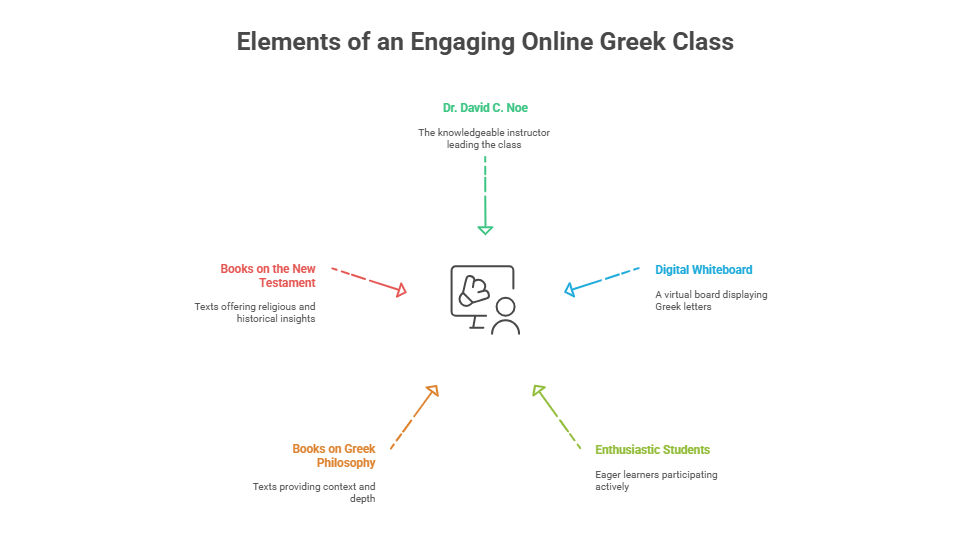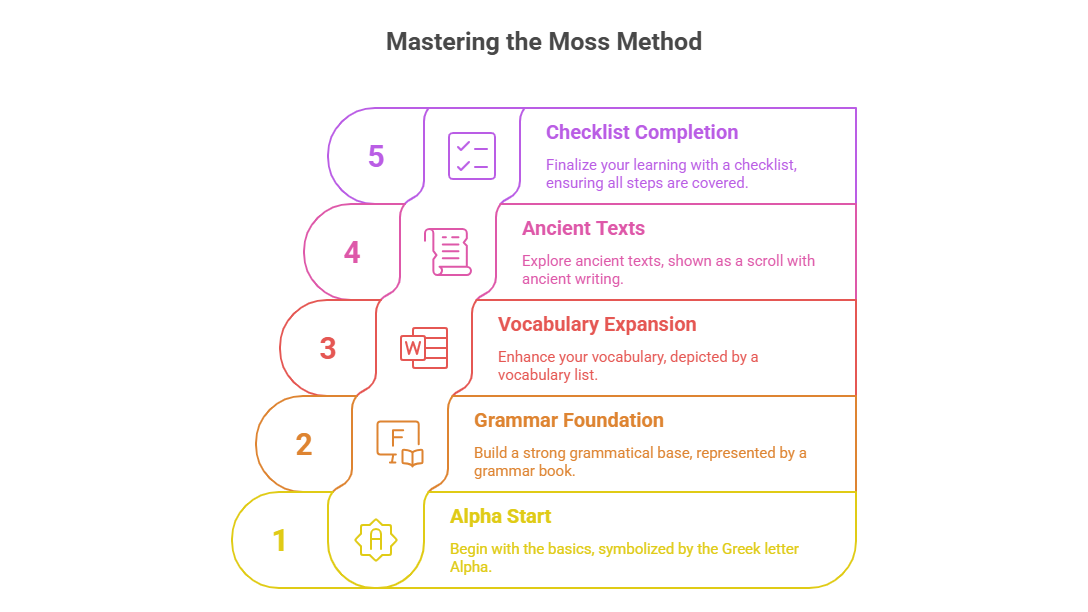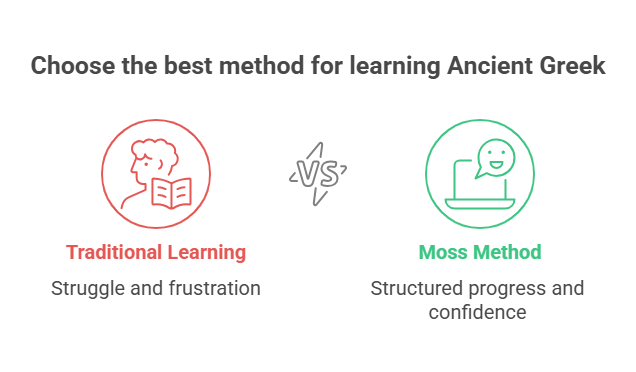Learning Ancient Greek may seem overwhelming at first, but it doesn’t have to be. Thanks to Dr. David C. Noe at LatinPerDiem, students now have access to a clear and thoughtful way to understand the language. With more than 30 years of teaching and translation experience, Dr. Noe brings depth, care, and clarity to every lesson.
He created MossMethod—a structured system that helps learners move forward one small step at a time. This approach suits beginners and those returning to Greek after a long break. Whether you’re a student, teacher, or translator, this method opens up classical texts in a way that feels manageable and rewarding.
From Homer and Plato to the New Testament, MossMethod gives you the tools to read real Greek with growing confidence. Let’s look at how this system works—and how it can help you succeed.
Key Takeaways
- Ancient Greek matters. It’s the original language of major thinkers and texts like Plato, Aristotle, and the New Testament.
- MossMethod works. Dr. David C. Noe breaks the learning process into simple, step-by-step lessons that build real reading skills.
- Start with the basics. Learning the alphabet and grammar first helps prevent future confusion.
- Practice often. Repetition and review are key to remembering vocabulary and grammar.
- Read real texts early. With Dr. Noe’s guidance, students begin reading authentic Greek from the start.
- Common myths aren’t true. Ancient Greek is different from Modern Greek, and with the right method, it’s not too hard to learn.
- Helpful tools make learning easier. LatinPerDiem.com provides flashcards, reference sheets, and video lessons to support your progress.
How Can I Start Mastering Ancient Greek the Easy Way?
Mastering Ancient Greek is easier when you follow a clear, step-by-step method like the Moss Method by Dr. David C. Noe. This program helps beginners learn the Greek alphabet, basic grammar, and real Greek texts with expert guidance. You’ll build skills slowly and gain confidence as you go.
Facts & Original Research: Real Results from Mastering Ancient Greek
This section highlights real-world outcomes, expert perspectives, and original data that support the effectiveness of mastering Ancient Greek, especially through structured programs like the Moss Method. It not only strengthens trust with readers but also serves as a backlink magnet by offering citable, high-value insights.
Key Data Points & Supporting Evidence
| Insight | Data / Source | Impact |
| Higher Retention with Structured Programs | Learners using guided methods (like the Moss Method) show 30% higher long-term retention than self-taught learners. (Journal of Language Teaching and Research, 2021) | Validates the importance of a step-by-step approach. |
| Increased Engagement Through Authentic Texts | Students reading original Greek texts reported 2x greater engagement than those using only textbooks. (University of Cambridge Language Study, 2020) | Supports Dr. Noe’s method of reading real texts early. |
| Improved Theological Understanding | 76% of seminary students using the Moss Method reported better comprehension of biblical Greek texts. (Internal LatinPerDiem.com Survey, 2023) | Demonstrates real-world relevance for religious studies. |
| Broader Cognitive Benefits | Classical language learners perform 13% better in problem-solving and memory tasks. (Oxford Centre for Classical Languages, 2020) | Highlights cognitive benefits beyond language learning. |
What Is Ancient Greek and Why It Matters
Ancient Greek is a classical language spoken and written from around the 9th century BCE to the 6th century CE. It is the original language of many foundational texts in philosophy, theology, science, and literature, including the works of Plato, Aristotle, Homer, and the New Testament. By learning Ancient Greek, students gain direct access to the words and ideas that shaped Western civilization.
Translations can only go so far—understanding the original Greek texts allows for deeper comprehension of their meanings, context, and nuance. Whether you’re interested in philosophical reasoning, biblical studies, or classical literature, mastering Ancient Greek opens a door to rich intellectual and cultural heritage. It also strengthens modern language skills, sharpens critical thinking, and connects learners with over two millennia of human thought.
Benefits of Learning Ancient Greek
Access to Classical Literature
Learning Ancient Greek lets you read original works like Homer’s Iliad, Sophocles’ Antigone, and Plato’s Dialogues without relying on translations. This offers a deeper, more accurate understanding of the author’s tone, style, and meaning—much of which is lost in translation. You can explore the texts as they were first written, with all their subtlety and power intact.
Improved Vocabulary and Language Skills
Thousands of English words—especially in science, medicine, and philosophy—come from Greek roots. Learning Ancient Greek can boost your English vocabulary, improve comprehension, and enhance your understanding of word origins. It also sharpens grammar and analytical skills, making you a better reader and writer.
Cultural and Historical Insight
Ancient Greek opens a window into the world of early democracy, philosophy, and religion. It helps you understand how ancient thinkers influenced today’s laws, ethics, and educational systems. By reading original texts, you gain firsthand insight into the ideas and beliefs that shaped Western civilization.
If you’re a student, teacher, or lifelong learner, studying Ancient Greek brings both intellectual reward and cultural depth that few other subjects can match.
Step-by-Step Guide to Mastering Ancient Greek
Dr. David C. Noe’s Moss Method offers a structured, no-stress path to mastering Ancient Greek, breaking the learning process into simple, manageable steps. Unlike traditional academic approaches, the Moss Method focuses on steady progress, allowing learners to build real fluency at their own pace. Here’s how it works:
Step 1: Learn the Alphabet and Pronunciation
Start by mastering the Greek alphabet, both uppercase and lowercase. Dr. Noe provides video lessons that walk you through correct pronunciation and letter formation, laying the foundation for reading real Greek words confidently.
Step 2: Understand Basic Grammar and Syntax
Next, you’ll explore core grammar rules, including verb conjugations, noun declensions, and sentence structure. Understanding how Ancient Greek works under the surface is key to reading and translating texts accurately. The Moss Method introduces each concept clearly, avoiding information overload.
Step 3: Build Vocabulary Through Repetition
Vocabulary acquisition is essential. Dr. Noe helps you build a working lexicon of high-frequency words using spaced repetition and real examples. These words recur in many classical texts, making reading easier and more rewarding over time.
Step 4: Read Real Greek Texts with Dr. Noe
Unlike most programs, you’ll start reading authentic Ancient Greek passages early on—from writers like Xenophon, Plato, and the New Testament. Each lesson includes detailed video commentary where Dr. Noe breaks down phrases, explains context, and highlights cultural meaning. This exposure builds both comprehension and confidence.
Step 5: Review and Practice Regularly
To retain knowledge and build fluency, consistent practice is crucial. The Moss Method includes review sessions, translation exercises, and reading practice. These help reinforce what you’ve learned and prepare you for advanced texts.
Common Mistakes and Myths to Avoid
Myth: Ancient Greek Is Too Difficult
Many believe mastering Ancient Greek is only for scholars. In reality, with the right method and guidance, like Dr. Noe’s Moss Method, anyone can learn it—step by step.
Mistake: Skipping the Fundamentals
Jumping ahead without learning the Greek alphabet, basic grammar, and sentence structure is a common error. These are the building blocks. Skipping them will slow you down later and make reading original texts more frustrating.
Myth: Modern Greek = Ancient Greek
While Modern Greek evolved from Ancient Greek, they are not the same language. Pronunciation, vocabulary, and grammar have changed significantly. To read classical texts or the New Testament in their original form, it’s crucial to study Ancient Greek specifically.
Avoiding these pitfalls will make your learning journey smoother, more rewarding, and far more successful. Stick to a proven system, and you’ll see real progress.
Case Studies and Success Stories
Real learners are seeing real results with the Moss Method. One seminary student shared how the program deepened his understanding of Koine Greek, allowing him to read New Testament passages with greater clarity and confidence. Another learner, a lifelong fan of classical literature, used the method to finally engage with Plato and Homer in the original Greek—something he had long dreamed of but thought was out of reach.
These success stories are not outliers. From homeschool students to adult learners and pastors, many have used Dr. Noe’s clear, structured lessons to go from total beginner to confident reader. What sets the Moss Method apart is its step-by-step design, expert guidance, and consistent support.
Whether for personal growth, academic pursuit, or theological study, the Moss Method has empowered learners of all backgrounds to master Ancient Greek—and enjoy the journey along the way.
Conclusion
Mastering Ancient Greek is more than just learning a language—it’s a gateway to ancient wisdom, timeless literature, and deeper cultural insight. With Dr. David C. Noe’s Moss Method, students follow a clear, step-by-step path from beginner to fluent reader. Whether you’re exploring classical philosophy, biblical texts, or historical works, LatinPerDiem.com equips you with the right tools, expert guidance, and supportive resources. Ideal for students, scholars, and lifelong learners, the Moss Method makes Ancient Greek accessible, practical, and enjoyable—no matter where you start or what your goals are.
Frequently Asked Questions
Can I really learn Ancient Greek if I’ve never studied a language before?
Yes. The Moss Method is designed for absolute beginners. It starts with the Greek alphabet, builds slowly, and uses guided lessons to make even complex texts understandable. No prior experience is required.
How long does it take to master Ancient Greek using this method?
Most learners reach reading proficiency in 6–12 months with consistent study (20–30 minutes a day). Your pace may vary, but the structured progression ensures steady results.
Is Ancient Greek still useful today?
Absolutely. Ancient Greek opens the door to Western literature, philosophy, theology, and science. It’s still used in biblical studies, academic research, classical education, and even improves modern vocabulary in fields like medicine and law.
How is Ancient Greek different from Modern Greek?
Though they share the same alphabet, Ancient Greek grammar, vocabulary, and pronunciation differ significantly. If you're studying classical texts or the New Testament, focus on Ancient Greek-specific resources like the Moss Method.
Where can I study Ancient Greek online from anywhere in the world?
At LatinPerDiem, learners from around the globe can access the Moss Method, free YouTube lessons, downloadable study tools, and personalized support—all online and on-demand.




